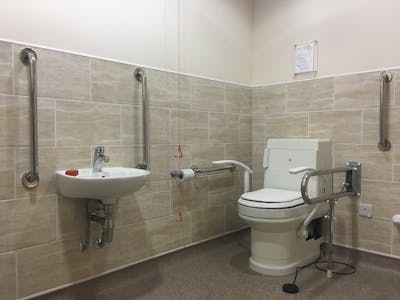Guide To Caring For An Elderly Parent | More Ability
Published: 22 April 2016
The UK population is ageing, this is unavoidable. With advances in medical science and a general healthier lifestyle, or awareness of such, people are living longer. Current predictions indicate that by 2034 23% of the UK population will be over 65, compared to only 18% being under the age of 16.
This, of course is great news, however doesn’t come without limitations, restrictions and obstacles. With an increasing number of seniors comes an increasing number of seniors in need of care. In fact, the number of people aged 65 and over in need of some form of care and/or support in order to continue to live safely and independently is set to increase to 1.7million over the next 20 years. This is the major obstacle that we must overcome.
Given the current media trolling around inadequate care being delivered by both public and private providers, not to mention the financial strains of retirement / care homes, more and more care is being facilitated by family members; predominantly sons, daughters and even grandchildren.
This specific type of role reversal is an unwelcoming and unwanted change for both parties. It’s a significantly stressful time within a parents & their children’s life’s that goes against everything you have been taught to present day. The care provider has become the one indeed of care and the one in need of care has become the provider. This in itself is an emotional, complex and impractical rollercoaster that no-one wants to be on.
So how do you care for an elderly parent?
That is the key question that unfortunately nobody truly knows the answer to. Yes there’s things that can and should be done in order to support & help manage the change however where behavioural dysfunctions meet emotional turmoil unpredictability can be the root of all evil.
The primary focus is to facilitate adequate care & love yet do so in a manner which allows both parties to continue to live independently. For that very reason the concept of multi-generation homes has been increasing year on year for the last decade. That said, whether you are seeking to care for an elderly parent by moving them in or looking to facilitate care while they remain independently within their own home there’s a number of things that can be done to help come to terms with and overcome this inevitable change.

Firstly acceptance. It is beneficial to both if you can come to terms and accept this change as quickly as possible. Denial has never done anybody any good and will only prolong the time it takes to get the right amount and type of care in place.
Secondly, and as important as it is to accept this change, it is also just as important to take things slowly. Look at this role reversal as a marathon, not a sprint. You won’t get things right the first time and there’s a lot to learn – don’t beat yourself up, you’re doing a great job!
Be prepared. And by that we mean be prepared for anything and everything, especially when it comes to behaviour. You may experience a great deal of emotion and/or anger it’s important you track these behavioural dysfunctions in order to understand, track and react accordingly.
You may now be the care provider however up until recently you were the care receiver – you need to bare this in mind. Offer autonomy by asking what your parent(s) want, demonstrating to them they are still the one who makes the important decisions. Couple this by reiterating their authority by such of asking for their advice is one way in which to come to terms with the change.
Finally you must continue to care for yourself, take time off, do things you like doing, make sure you get enough rest etc. This may seem like an unachievable command so it is important to explore all your options when it comes to receiving support or additional help as a care provider.
What are your options?
Whether your elderly parent is looking to stay within their own home or move in with yourself we highly recommend undertaking a carer’s assessment. This type of assessment doesn’t look into how you provide care it assess how much support you need in order to provide the care. Different to the community care assessment which evaluates a relatives needs a carers assessment aims to offer you emotional support, breaks from providing care and potentially financial help with required home adaptations. Therefore it is important to be truthful and realistic within your assessment, failure to do so can result in inadequate help, care & support being provided.
Reducing the reliance and strain you put on yourself is key to staying sane and providing the best possible type of care. Aside from the above assessment there are a number other initiatives you can put in place to help overcome the amount of reliance you put on yourself and provide your parent with the independence they require.
An area in which we are all too familiar with is home adaptations, predominantly bathroom alterations and adaptations however also building, internal & external, and kitchen adaptations having specialised in providing such a service for over 50years.
The bathroom is the biggest area of concern when it comes to caring for an elderly parent. It is the biggest risk if left un-adapted in terms of slips, trips & falls and is also the least dignifying task with regards to washing & bathing a parent – for both parties.
We would recommend a carers assessment to determine what support could be provided with regards to this significant adaptation that would make a huge difference on both parties’ lives. Alternatively work could be provided privately by means of converting a bathroom to a shower room or transforming a downstairs room to a wash room facility. Either way by taking the necessary steps to facilitate independent bathing will offer safety, peace of mind and additional dignity by means of bathing oneself, to all involved.

Rewarding benefits
Finally this article may highlight the many obstacles that lay in your way however they are combined with rewarding benefits, once tackled and overcome. As we bring this article to a close of course it is only fitting we finish on a good note and highlight a selected handful of such benefits as a reminder to yourself just why, who and what for you are doing this for.
1) You can to oversee the care being given and received meaning you can be assured a loved one is in good company, surroundings, is being well looked after and receiving the right amount of attention, is loved and above all is happy.
2) While you’re around you can be assured your loved one will not have to deal with or succumb to any types of financial pressures. It’s a said state of affairs when the vulnerable are prayed on financially however while you’re around this won’t be an issue.
3) No expensive financial arrangements are required for care and you know exactly what kind of care they are receiving
4) Time. The biggest benefit of all is the precious / quality time you get to spend with your loved one. No other benefit will compare to this and no amount of obstacles will ever withstand overcoming to achieve such.

MoreAbility*, part of the Passmore Group, is Yorkshires leading and most experienced bath & shower room specialist for all types of stylish, safe & practical and bespoke solutions. Offering a fully project managed design & installation service we pride ourselves on meeting individual wants, needs and aspirational requirements.
Share this Post





.jpg?auto=compress%2Cformat&cs=strip&fit=clip&h=400&ixlib=php-1.1.0&w=400&s=9fa3862dd64550f902ce5099d00692fb)




















